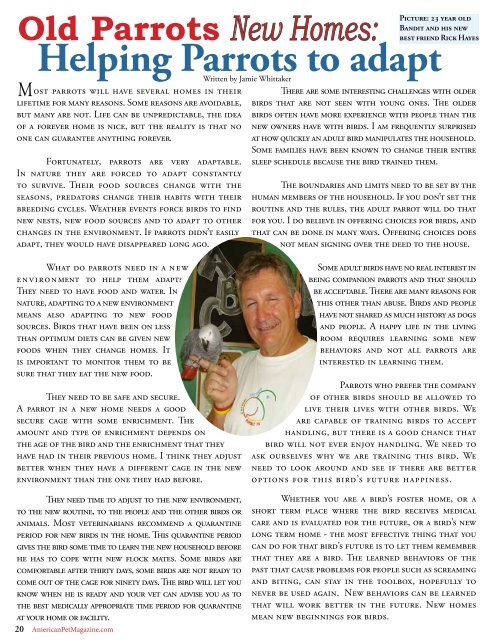HELP Animal Welfare - American Pet Magazine ...
HELP Animal Welfare - American Pet Magazine ...
HELP Animal Welfare - American Pet Magazine ...
You also want an ePaper? Increase the reach of your titles
YUMPU automatically turns print PDFs into web optimized ePapers that Google loves.
Old Parrots New Homes:<br />
Picture: 23 year old<br />
Bandit and his new<br />
best friend Rick Hayes<br />
Helping Parrots to adapt<br />
Written by Jamie Whittaker<br />
Most parrots will have several homes in their<br />
lifetime for many reasons. Some reasons are avoidable,<br />
but many are not. Life can be unpredictable, the idea<br />
of a forever home is nice, but the reality is that no<br />
one can guarantee anything forever.<br />
Fortunately, parrots are very adaptable.<br />
In nature they are forced to adapt constantly<br />
to survive. Their food sources change with the<br />
seasons, predators change their habits with their<br />
breeding cycles. Weather events force birds to find<br />
new nests, new food sources and to adapt to other<br />
changes in the environment. If parrots didn’t easily<br />
adapt, they would have disappeared long ago.<br />
What do parrots need in a new<br />
environment to help them adapt?<br />
They need to have food and water. In<br />
nature, adapting to a new environment<br />
means also adapting to new food<br />
sources. Birds that have been on less<br />
than optimum diets can be given new<br />
foods when they change homes. It<br />
is important to monitor them to be<br />
sure that they eat the new food.<br />
They need to be safe and secure.<br />
A parrot in a new home needs a good<br />
secure cage with some enrichment. The<br />
amount and type of enrichment depends on<br />
the age of the bird and the enrichment that they<br />
have had in their previous home. I think they adjust<br />
better when they have a different cage in the new<br />
environment than the one they had before.<br />
They need time to adjust to the new environment,<br />
to the new routine, to the people and the other birds or<br />
animals. Most veterinarians recommend a quarantine<br />
period for new birds in the home. This quarantine period<br />
gives the bird some time to learn the new household before<br />
he has to cope with new flock mates. Some birds are<br />
comfortable after thirty days, some birds are not ready to<br />
come out of the cage for ninety days. The bird will let you<br />
know when he is ready and your vet can advise you as to<br />
the best medically appropriate time period for quarantine<br />
at your home or facility.<br />
20 <strong>American</strong><strong>Pet</strong><strong>Magazine</strong>.com<br />
There are some interesting challenges with older<br />
birds that are not seen with young ones. The older<br />
birds often have more experience with people than the<br />
new owners have with birds. I am frequently surprised<br />
at how quickly an adult bird manipulates the household.<br />
Some families have been known to change their entire<br />
sleep schedule because the bird trained them.<br />
The boundaries and limits need to be set by the<br />
human members of the household. If you don’t set the<br />
routine and the rules, the adult parrot will do that<br />
for you. I do believe in offering choices for birds, and<br />
that can be done in many ways. Offering choices does<br />
not mean signing over the deed to the house.<br />
Some adult birds have no real interest in<br />
being companion parrots and that should<br />
be acceptable. There are many reasons for<br />
this other than abuse. Birds and people<br />
have not shared as much history as dogs<br />
and people. A happy life in the living<br />
room requires learning some new<br />
behaviors and not all parrots are<br />
interested in learning them.<br />
Parrots who prefer the company<br />
of other birds should be allowed to<br />
live their lives with other birds. We<br />
are capable of training birds to accept<br />
handling, but there is a good chance that<br />
bird will not ever enjoy handling. We need to<br />
ask ourselves why we are training this bird. We<br />
need to look around and see if there are better<br />
options for this bird’s future happiness.<br />
Whether you are a bird’s foster home, or a<br />
short term place where the bird receives medical<br />
care and is evaluated for the future, or a bird’s new<br />
long term home - the most effective thing that you<br />
can do for that bird’s future is to let them remember<br />
that they are a bird. The learned behaviors of the<br />
past that cause problems for people such as screaming<br />
and biting, can stay in the toolbox, hopefully to<br />
never be used again. New behaviors can be learned<br />
that will work better in the future. New homes<br />
mean new beginnings for birds.



